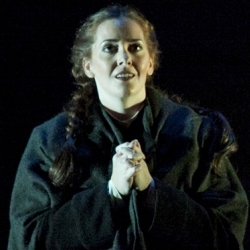Carmen (Welsh National Opera – tour)

Leiser and Caurier shows usually stand the test of time very well, but here much of the direction feels stagey and clichéd (I was growing weary of cod-flamenco gestures well before the first interval), and the heat and energy of the crowd-scenes in particular is conspicuous by its absence. The brawling factory-girls are sufficiently well-behaved to pass muster in Gilbert & Sullivan, while the build-up to the bullfight has all the sweaty volatility of a village fete.
Mediocre leads don’t help. Kirstin Chavez's Carmen is strong on blowsy truculence but pretty much devoid of the innate sensuality and allure that apparently captivates Jose, Escamillo and the droves of officers and smugglers alike. Even more problematic were the persistent vocal issues which dogged the first two acts in particular: a fairly whopping technical mishap in her opening recitative augured ill, and the Habanera which followed veered uncomfortably off-pitch at the cadences. I was unsure whether the rhythmic imprecision here was a deliberate characterisation decision, but a general tendency to sing well behind James Southall‘s very clear beat elsewhere suggested it was by accident rather than design. Intonation continued to be alarmingly wayward during lightly accompanied passages such as the arrest scene and the lap-dance-with-castanets chez Lillas Pastia, but the more dramatic passages in the last two acts benefited from a flaming chest-voice and plenty of general firepower.
Her José, WNO stalwart Gwyn Hughes Jones, was also at his best in the latter stretches of his role, singing strongly in the final confrontation scene even if there was little to suggest homicidal potential until the very last minute. Earlier on, he seemed physically awkward whether fighting or fornicating, and whilst the voice is technically rock-solid his rather prosaic singing was disappointingly short on the introspection and eloquence that the role really needs.
'As a first experience of the opera it's serviceable'
Not helped by Lovejoy-esque styling, Kostas Smoriginas as Escamillo was also light on charisma and offered bluff, broad-brush singing with often rather approximate French. It’s testimony to the singers in the smaller roles, particularly Samantha Hay and Emma Carrington, packing pleasingly contrasting voices as Frasquita and Mercedes, that the ensembles like the Card Trio and quintet had more show-stopping quality than the familiar arias.
It was left to Jessica Muirhead to supply the evening’s poetry and pathos almost single-handedly: her expressively-sung Micaela was the vocal highlight by a long chalk (particularly in the great act three prayer, graced by some truly exquisite horn-playing). What a breath of fresh air, too, to see a Micaela who’s not only feistier than usual but even – gasp – just a little flirty and funny in her early scenes. Her awkwardness with Jose in their duet stems not from generalised girliness but from exasperation at her potential mother-in-law’s cringe-worthy matchmaking methods.
The other outstanding contribution came from the ever-excellent WNO orchestra and their very young conductor, who directed with palpable energy and imagination even if his singers responded in kind only too rarely. Special mention, too, for the splendid children’s chorus, who sang with absolute precision without sounding like well-drilled choirboys instead of street urchins.
Three stars, then, one of which is for Southall and the orchestra. As a first experience of the opera it's serviceable, but anyone hoping for a fresh take on a repertoire staple should really look elsewhere.










